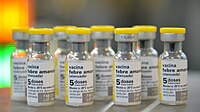
Photo from wikipedia
INTRODUCTION Vaccination is the most important measure for prevention and control of yellow fever. It is recommended by the World Health Organization (WHO) for residents of endemic areas and travelers… Click to show full abstract
INTRODUCTION Vaccination is the most important measure for prevention and control of yellow fever. It is recommended by the World Health Organization (WHO) for residents of endemic areas and travelers to risk areas. In 2013, the WHO discontinued the recommendation of booster doses every 10 years, indicating a single dose as sufficient for lifelong protection. OBJECTIVE Considering the lower immune response to YF vaccine in children compared to adults, this study was set out to assess the duration of immunity to YF in children vaccinated in the first two years of life. METHODS This cross-sectional study involved children aged 9 months to 12 years with accessible vaccination records recruited in primary care units from a metropolitan area in Southeast Brazil. The serologic status (negative, indeterminate and positive), and geometric mean titers (GMT, inverse dilution) of neutralizing antibodies against YF obtained by Plaque Reduction Neutralization Test was assessed across categories of time after YF vaccination. The strength of association of seropositivity with time was assessed by the odds ratio (OR) taking recent vaccination (1-6 months) as reference. RESULTS A total of 824 children recruited from August 2010 to July 2011were tested. The proportion of seropositivity (95% C.I.) and GMT (95% C.I.) dropped markedly across time periods: from 86.7% (80.5-91.4%), GMT 47.9 (38.3-59.9) in newly vaccinated to 59.0% (49.7-67.8%), GMT 14.8 (11.6-19.1) and 42.2% (33.8-51.0), GMT 8.6 (7.1-12.1), respectively in the subgroups vaccinated 31-72 months and 73-100 months before. CONCLUSIONS Analogous to previous findings in adults, these data support the need for revaccination of children living in areas with yellow fever virus circulation in humans or in other primates. The data also supported the change of a booster dose to 4 years of age for those primarily vaccinated for yellow fever in the first two years of life.
Journal Title: Vaccine
Year Published: 2019
Link to full text (if available)
Share on Social Media: Sign Up to like & get
recommendations!